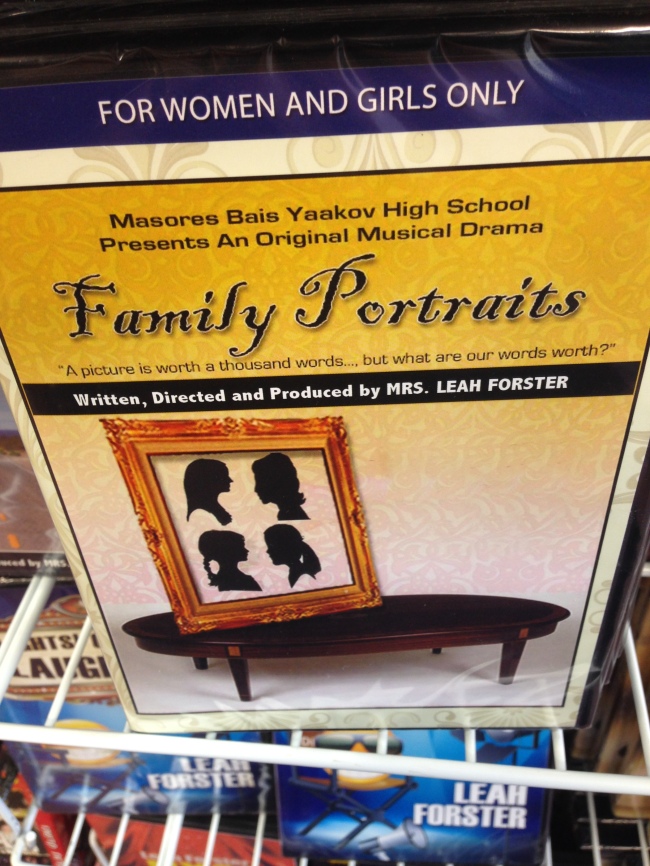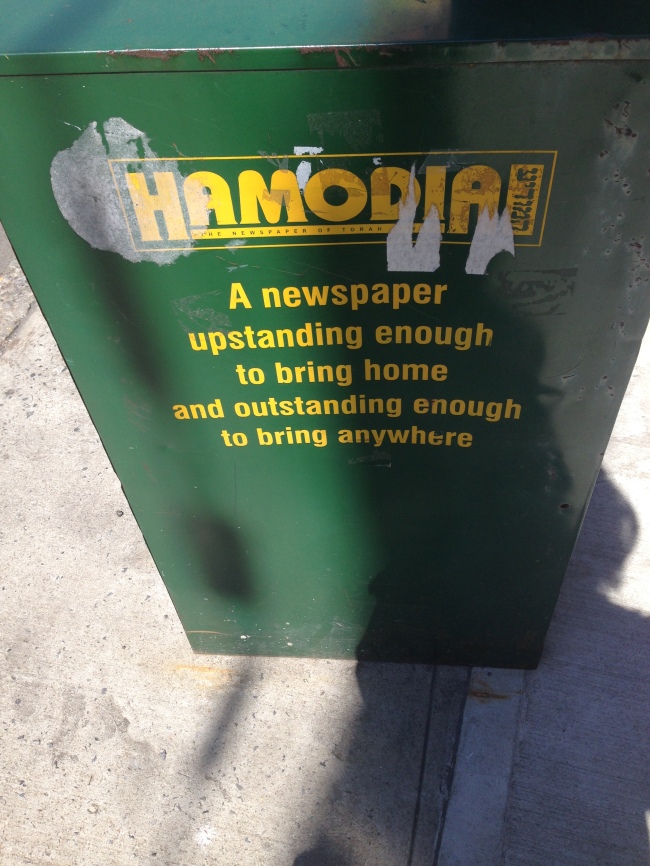Where, I wondered, would be a good place to avoid Easter crowds today?
The answer? A Hasidic Jewish neighborhood.
So off I went, to Borough Park, Brooklyn, which allegedly has the highest concentration of Orthodox Jews outside of Israel, according to several Internet sources (I’m not testifying to this fact).
The first sign of the devotion to Orthodox culture I saw was a school bus with Hebrew letters I spotted from the subway. Then, across the platform, a family — a couple probably not much older than me, and six girls.
When I got off the train, I immediately noted that most of the stores had signs in either Hebrew lettering or Yiddish, often both. I’m not terribly well-versed in the Orthodox or Hasidic culture and practices, so I find the opportunity to observe a little more closely to be interesting. There’s plenty to be learned by reading, of course, but sometimes it’s nice to just see what you can see.
One thing I do know is that Orthodox Jews have particular (and perhaps, to outsiders, peculiar) practices of dress. The women adhere to practices of tznius, or modesty, so I was sure to dress in a manner that was respectful (long skirt, shirt that didn’t show cleavage, trench coat over). Married women don’t show their natural hair outside the home, so most ladies had on wigs.
The men are more recognizable, perhaps (payot, hats, black coats, often tallit), but I’m less familiar with the whys and wherefores of their practices. Frankly, I’m a little more interested in the roles of women, and the interactions between men and women. I noted, for example, in a music and movies store, that a shelf of DVD’s was indicated as being intended only for females.
My first exposure to the Hasidic culture was around age 11. My parents were doing some business with a photographer, and he came to our apartment. In my attempt to be grown-up and polite, I extended my hand and said “nice to meet you.” He recoiled, or at least, that’s how I remember it. I didn’t know that Hasidic men do not touch women other than (as I understand it now) their wives, mothers, daughters and sisters. I was naive (and a child) and he was abrupt, so I was insulted.
As I’ve learned a bit more over the years, however, the understanding I’ve come to, and this might be flawed, is that a lack of physical contact, sometimes even a lack of eye contact, is not meant to indicate that women are sub-par, but that it’s meant to preserve the specialness of contact between a husband and wife. The traditions are very different than what I (or most people I know) have grown up with, and from an outside point of view, it’s easy to look upon it as repressive and regressive. The only thing I know now is that I would have to conduct extensive research and interviews before even beginning to come to that, or any, conclusion. More research than can be done with a fast Google search.
I did notice one behavior that gave me pause, however. Several times this afternoon, I held doors for women with strollers, and not one said “thank you.” And several other times, men squeezed by me in store aisles, even bumping into me a couple of times, but none said “excuse me.” That made me curious. Was it because I was female? Because I am clearly an outsider? Or are they just being New Yorkers? For the record, plenty of us do have good manners. Or was there another reason?
I like it when I walk away from a new experience with more questions than answers. I think figuring out the questions is just as important as knowing what the answers are. That said, if anyone would like to share any relevant knowledge or recommend resources for learning more, please do so.


I’ve heard from a few non-Jews who work for Jewish events that many of the children never have said a “please” or a “thank you” to the worker. I find this unfortunate because I say thank you to EVERYONE – including the guy who is paid by my leasing company to do my lawn service. I’m thankful they are working and willing to be contracted to do my lawn so I don’t have to! Perhaps it’s a cultural thing, perhaps it’s an abrupt New Yorker thing. New York attitudes heavily infiltrate the observant Jewish culture in some cases since many grow up in New York just as much as their hometown due to family, Jewish HQ’s, etc. I’m glad you had a nice time in Crown Heights!